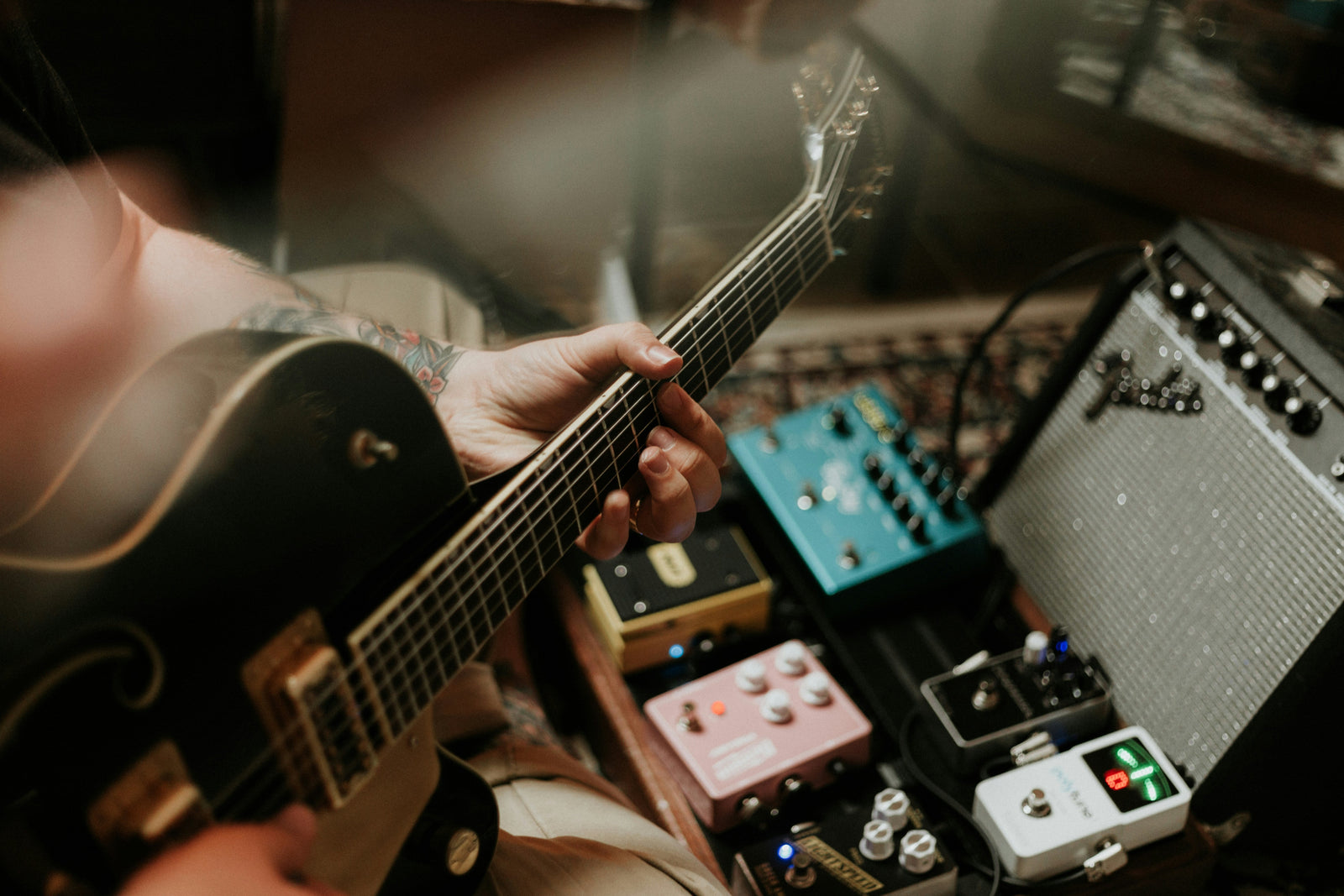Guitar Tuner vs. Card-type Metronome: Which is Best for You?
Every musician needs the right tools to refine their craft. Choosing between a guitar tuner and a card-type metronome can be challenging. Both devices offer unique benefits that enhance practice sessions.
Guitar tuners ensure your instrument stays tuned to precision. It is crucial for clear sound production. Card-type metronomes, so, help maintain consistent timing, vital for developing rhythmic skills.
Understanding how each tool impacts your practice will guide your decision. This comparison aims to highlight the functionalities and advantages of each. Helping you select the best fit for your musical journey. Deciding on the right tool is not about preference but about what best meets your practice needs.
Guitar Tuner vs. Card-type Metronome: Understanding the Basics
|
Feature |
Guitar Tuner |
Card-type Metronome |
|
Purpose |
Adjusts the pitch of guitar strings to correct notes |
Produces a steady beat to maintain rhythm |
|
Primary Function |
Pitch detection and display |
Tempo setting with auditory or visual cues |
|
Types |
Clip-on, pedal, app-based |
Digital with various beat and rhythm settings |
|
Usage Scenario |
Tuning before practices and performances |
Used during practice to develop timing skills |
|
Convenience |
Portable, easy to use in various settings |
Highly portable, essential for tempo consistency |
|
Additional Features |
Some models have metronome functions |
Some have a tapping feature to find the tempo |
|
Ideal For |
Musicians need accurate pitch |
Musicians focusing on rhythmic accuracy |
This table summarizes the primary uses and features of each device. It highlights how they cater to different aspects of musical practice.
Guitar tuners are essential for ensuring your instrument sounds harmonious and correct. Card-type metronomes are crucial for developing consistent timing in music.
Each tool plays a unique role in a musician's development and performance.
Functionality and Usability: Guitar Tuner vs. Card-type Metronome
Choosing the right musical tool involves assessing functionality and usability. Both a guitar tuner and a card-type metronome enhance musicians' practice and performance.
Ease of Use
Guitar tuners are simple to operate. They show if strings are in tune in an instant, ideal for quick checks before performances. Clip-on tuners attach to the instrument, showing the tuning status.
Card-type metronomes maintain a steady tempo and are pocket-sized for easy transport. They have simple controls for setting tempo, which is useful for practice anywhere.
Both devices feature clear digital displays, making settings easy to read during use.
Features
Guitar tuners offer various tuning modes for different instruments. This versatility benefits musicians who play many instruments.
Card-type metronomes provide complex rhythms and various time signatures. This is crucial for advanced rhythmic training.
Some models combine tuner and metronome functions, saving space and cost for musicians.
The choice between a guitar tuner vs. a card-type metronome depends on a musician's needs. Tuners are essential for correct instrument sound, while metronomes improve timing.
Both devices are intuitive, allowing easy use without extensive training.
Accuracy and Performance: Guitar Tuner vs. Card-type Metronome
Accuracy is crucial for any music practice tool, whether a guitar tuner or a card-type metronome.
Guitar tuners use digital technology to measure note frequencies. High-quality tuners ensure your instrument stays tuned, which is crucial for optimal sound.
Card-type metronomes maintain consistent tempos using quartz or digital technology. This steadiness is essential for developing accurate rhythm skills.
Both devices are generally reliable. But, the performance can vary with different models and technologies. Advanced models often feature improved accuracy and more functions.
Electronic components in both tools can degrade over time. Regular maintenance can help sustain their accuracy and functionality.
For beginners, the regular tempo of a metronome may be more immediately beneficial. Experienced musicians often value the precise tuning that tuners provide.
The choice between a tuner and a metronome depends on your musical focus. Both are reliable, but your needs determine which is more critical.
Essential Tools for Beginners: Guitar Tuner vs. Card-type Metronome
|
Tool |
Purpose |
Benefits for beginners |
|
Guitar Tuner |
Ensures the guitar is accurately tuned. |
Helps develop a good ear for pitch and harmony. |
|
Card-type Metronome |
Maintains a consistent tempo during practice. |
Improves timing and rhythm skills, essential for any music. |
Experts recommend both tools for beginners to enhance different aspects of musical training. Consider your personal focus areas when choosing between them. You can also opt to use both for a comprehensive practice routine.
Card-type Metronome: Recommendation
KORG Card-type Metronome
The MA-2 Metronome suits musicians who need reliable rhythm support. It is an upgrade from the MA-1, with enhanced features for both practice and performance.
The MA-2 is easy to use and more visible than before. Its display has grown by 30%, making it easier to read during use. A digital needle moves across this display. It provides both visual and audible beat cues.
Key Features:
- Enhanced Visibility: The larger display makes it easy to check settings.
- Audible and Visual Beat Indicators: These help keep rhythm through sight and sound.
- Versatile Tempo Settings: Adjusts to various musical styles with different tempo methods.
This device supports a wide tempo range and many beat patterns. It is suitable for diverse musical practices. It features a robust buzzer emitting clear, loud sounds. These sounds are distinguishable even in noisy areas.
The MA-2 also has a practical design with a folding stand for stability. It includes a secure battery cover to prevent loss during battery changes.
The MA-2 Metronome helps musicians to improve their timing and rhythm. It supports various time signatures and rhythms. Stylish color options make it a popular choice for those who value aesthetics. It also offers high performance.
Explore our comprehensive 'Guitar Tuner Ultimate Guide: An In-Depth Overview.' Delve into detailed insights and recommendations to choose the best guitar tuner for your needs.
Choosing Between Guitar Tuner vs. Card-type Metronome: Features to Consider
When deciding between a guitar tuner and a card-type metronome, consider key features.. Each tool offers unique benefits that cater to different aspects of musical practice.
- Accuracy: Look for a tuner that provides precise tuning. Accuracy is essential for ensuring your instrument sounds its best.
- Functionality: Consider a metronome that offers various rhythm patterns and tempo settings. This diversity helps in mastering complex pieces.
- Portability:If you often move around, choose devices that are easy to transport. Both tools come in compact sizes that fit in gig bags.
- Ease of Use: Opt for devices with intuitive interfaces. Beginners should look for simple, straightforward controls.
- Durability: Ensure the device is well-built to withstand frequent use. Especially if you travel often.
- Battery Life:For both tuners and metronomes, long battery life is a plus. It means less worry about mid-practice powerouts.
- Price: Budget plays a crucial role. Balance between cost and the features you need.
- Extra Features: Some tuners and metronomes include extra functionalities. Like metronome sounds within tuners or a tuner function in metronomes.
- Versatility: Multi-instrument tuners are useful if you play more than one instrument. Metronomes that handle different time signatures offer more practice flexibility.
- Visual Aids: For tuners, a clear display is crucial. Metronomes with visual beat indicators can also be very helpful.
Making the right choice involves understanding your needs in your musical journey. Whether improving pitch with a tuner or enhancing timing with a metronome. Selecting the right device will boost your skills effectively.
Conclusion: Guitar Tuner vs. Card-type Metronome - Harmonizing Your Practice
Choosing between a guitar tuner and a metronome depends on your practice needs. Both are key for developing musicianship. Tuners ensure musicians pitch their instruments, which is essential for any musician. Metronomes improve timing, which is crucial for ensemble and solo play.
Assess which aspect of your musicianship needs more support. Opt for a tuner for pitch accuracy or a metronome for rhythm. Having both can enhance your practice. They complement each other and support comprehensive musical growth.
Incorporate the right tools to boost your skills and confidence. Choose wisely to enhance both practice and performance.





